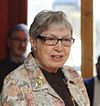List of presidents of the Lagting since 1945, one of the two subdivisions of the Parliament of Norway from 1945 to 2009, when the chamber was discontinued.
| No. | Portrait | President | Took office | Left office | Time in office | Party |
|---|---|---|---|---|---|---|
| 1 | Jakob A. Lothe [2] (1881–1975) | 10 December 1945 | 10 January 1954 | 8 years, 31 days | Liberal | |
| 2 | Bent Røiseland (1902–1981) | 16 January 1954 | 11 January 1959 | 4 years, 360 days | Liberal | |
| 3 | Elisæus Vatnaland (1892–1983) | 12 January 1959 | 30 September 1960 | 1 year, 262 days | Centre | |
| (2) | Bent Røiseland (1902–1981) | 1 October 1960 | 30 September 1961 | 364 days | Liberal | |
| 4 | Nils Hønsvald (1899–1971) | 6 October 1961 | 30 September 1965 | 3 years, 359 days | Labour | |
| (2) | Bent Røiseland (1902–1981) | 8 October 1965 | 30 September 1969 | 3 years, 357 days | Liberal | |
| 5 | Lars Korvald (1916–2006) | 8 October 1969 | 18 October 1972 | 3 years, 10 days | Christian Democratic | |
| 6 | Egil Aarvik (1912–1990) | 24 October 1972 | 30 September 1973 | 341 days | Christian Democratic | |
| 7 | Torild Skard [4] (born 1936) | 9 October 1973 | 30 September 1977 | 3 years, 356 days | Socialist Left | |
| 8 | Margit Tøsdal (1918–1993) | 11 October 1977 | 30 September 1981 | 3 years, 354 days | Labour | |
| 9 | Thor Knudsen (1927–2006) | 8 October 1981 | 30 September 1989 | 7 years, 357 days | Conservative | |
| 10 | Hans J. Røsjorde (born 1941) | 10 October 1989 | 30 September 1993 | 3 years, 355 days | Progress | |
| 11 | Jan P. Syse (1930–1997) | 11 October 1993 | 17 September 1997 | 3 years, 341 days | Conservative | |
| 12 | Odd Holten (born 1940) | 8 October 1997 | 30 September 2001 | 3 years, 357 days | Christian Democratic | |
| 13 | Lodve Solholm (born 1949) | 9 October 2001 | 30 September 2005 | 3 years, 356 days | Progress | |
| 14 | Inge Lønning (1938–2013) | 10 October 2005 | 30 September 2009 | 3 years, 355 days | Conservative |








